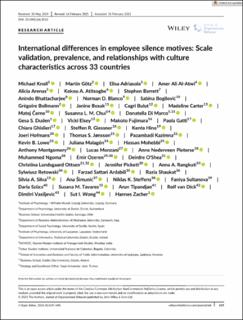International Differences in Employee Silence Motives: Scale Validation, Prevalence, and Relationships with Culture Characteristics across 33 Countries
| dc.contributor.author | Knoll, Michael | |
| dc.contributor.author | Gotz, Martin | |
| dc.contributor.author | Adriasola, Elisa | |
| dc.contributor.author | AI-Atwi, Amer Ali | |
| dc.contributor.author | Arenas, Alicia | |
| dc.contributor.author | Atitsogbe, Kokou A. | |
| dc.contributor.author | Barrett, Stephen | |
| dc.contributor.author | Bhattacharjee, Anindo | |
| dc.contributor.author | Blanco C., Norman D. | |
| dc.contributor.author | Bogilovic, Sabina | |
| dc.contributor.author | Bollmann, Gregoire | |
| dc.contributor.author | Bosak, Janine | |
| dc.contributor.author | Bulut, Cagri | |
| dc.contributor.author | Carter, Madeline | |
| dc.contributor.author | Černe, Matej | |
| dc.contributor.author | Chui, Susanna L. M. | |
| dc.contributor.author | Marco, Donatella Di | |
| dc.contributor.author | Duden, Gesa | |
| dc.contributor.author | Elsey, Vicki | |
| dc.contributor.author | Fujimura, Makoto | |
| dc.contributor.author | Gatti, Paola | |
| dc.contributor.author | Ghislieri, Chiara | |
| dc.contributor.author | Giessner, Steffen Robert | |
| dc.contributor.author | Hino, Kenta | |
| dc.contributor.author | Hofmans, Joeri | |
| dc.contributor.author | Jønsson, Thomas Faurholt | |
| dc.contributor.author | Kazimna, Pazambadi | |
| dc.contributor.author | Lowe, Kevin B. | |
| dc.contributor.author | Malagon, Juliana | |
| dc.contributor.author | Mohebbi, Hassan | |
| dc.contributor.author | Montgomery, Anthony | |
| dc.contributor.author | Monzani, Lucas | |
| dc.contributor.author | Pieterse, Anne Nederveen | |
| dc.contributor.author | Ngoma, Muhammed | |
| dc.contributor.author | Ozeren, Emir | |
| dc.contributor.author | O'Shea, Deirdre | |
| dc.contributor.author | Ottsen, Christina Lundsgaard | |
| dc.contributor.author | Pickett, Jennifer | |
| dc.contributor.author | Rangkuti, Anna Armeini | |
| dc.contributor.author | Retowski, Sylwiusz | |
| dc.contributor.author | Ardabili, Farzad Sattari | |
| dc.contributor.author | Shaukat, Razia | |
| dc.contributor.author | Silva, Silvia A. | |
| dc.contributor.author | Simunic, Ana | |
| dc.contributor.author | Steffens, Niklas K. | |
| dc.contributor.author | Sultanova, Faniya | |
| dc.contributor.author | Szucs, Daria | |
| dc.contributor.author | Tavares, Susana M. | |
| dc.contributor.author | Tipandjan, Arun | |
| dc.contributor.author | Van Dick, Rolf | |
| dc.contributor.author | Vasiljevic, Dimitri | |
| dc.contributor.author | Wong, Sut I | |
| dc.contributor.author | Zacher, Hannes | |
| dc.date.accessioned | 2021-09-29T11:18:07Z | |
| dc.date.available | 2021-09-29T11:18:07Z | |
| dc.date.created | 2021-03-13T11:52:55Z | |
| dc.date.issued | 2021 | |
| dc.identifier.citation | Journal of Organizational Behavior. 2021, Volume 42, Issue 5, Pages 619-648 | en_US |
| dc.identifier.issn | 0894-3796 | |
| dc.identifier.uri | https://hdl.handle.net/11250/2786001 | |
| dc.description.abstract | Employee silence, the withholding of work-related ideas, questions, or concerns from someone who could effect change, has been proposed to hamper individual and collective learning as well as the detection of errors and unethical behaviors in many areas of the world. To facilitate cross-cultural research, we validated an instrument measuring four employee silence motives (i.e., silence based on fear, resignation, prosocial, and selfish motives) in 21 languages. Across 33 countries (N = 8,222) representing diverse cultural clusters, the instrument shows good psychometric properties (i.e., internal reliabilities, factor structure, and measurement invariance). Results further revealed similarities and differences in the prevalence of silence motives between countries, but did not necessarily support cultural stereotypes. To explore the role of culture for silence, we examined relationships of silence motives with the societal practices cultural dimensions from the GLOBE Program. We found relationships between silence motives and power distance, institutional collectivism, and uncertainty avoidance. Overall, the findings suggest that relationships between silence and cultural dimensions are more complex than commonly assumed. We discuss the explanatory power of nations as (cultural) units of analysis, our social scientific approach, the predictive value of cultural dimensions, and opportunities to extend silence research geographically, methodologically, and conceptually. | en_US |
| dc.language.iso | eng | en_US |
| dc.publisher | Wiley | en_US |
| dc.rights | Navngivelse-Ikkekommersiell-DelPåSammeVilkår 4.0 Internasjonal | * |
| dc.rights.uri | http://creativecommons.org/licenses/by-nc-sa/4.0/deed.no | * |
| dc.title | International Differences in Employee Silence Motives: Scale Validation, Prevalence, and Relationships with Culture Characteristics across 33 Countries | en_US |
| dc.type | Journal article | en_US |
| dc.type | Peer reviewed | en_US |
| dc.description.version | publishedVersion | en_US |
| dc.source.pagenumber | 619-648 | en_US |
| dc.source.volume | 42 | en_US |
| dc.source.journal | Journal of Organizational Behavior | en_US |
| dc.source.issue | 5 | en_US |
| dc.identifier.doi | https://doi.org/10.1002/job.2512 | |
| dc.identifier.cristin | 1897828 | |
| cristin.ispublished | true | |
| cristin.fulltext | original | |
| cristin.qualitycode | 2 |
Tilhørende fil(er)
Denne innførselen finnes i følgende samling(er)
-
Scientific articles [2173]

